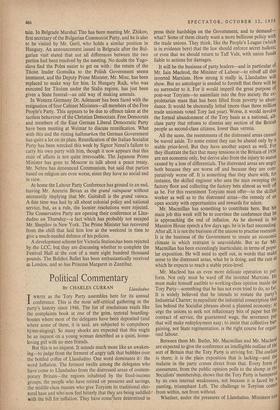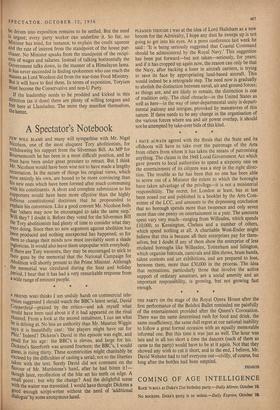Political Commentary BY CHARLES CURRAN
Llandudno
IWRITE as the Tory Party assembles here for its annual conference. This is the most self-critical gathering in the party's history since 1946. The list of resolutions reads like the complaints book at one of the grim, teetotal boarding- houses where most of the delegates have been deposited (and where some of them, it is said, are subjected to compulsory hymn-singing). So many shocks are expected that this might be an inquest on a young woman described as a quiet, home- loving girl with no men friends.
But this is no inquest. It sounds much more like an awaken- ing—to judge from the ferment of angry talk that bubbles over the bottled coffee of Llandudno. One word dominates it : the word Inflation. The ferment swells among the delegates who have come to Llandudno from the distressed areas of contem- porary Britain—the regions inhabited by the fixed-income groups, the people who have retired on pensions and savings, the middle-class masses who give Toryism its traditional elec- toral base and who now feel bitterly that they are being saddled with the bill for inflation. They have come here determined to press their hardships on the Government, and to demand- what? Some of them clearly want a more bellicose policy with the trade unions. They think, like the People's League (which is in evidence here) that the law should enforce secret ballots; or even that we should return to Taff Vale, with union funds liable to actions for damages.
It will be the business of party leaders—and in particular of Mr. lain Macleod, the Minister of Labour—to rebuff all this inverted Marxism. How strong it really is, Llandudno will show. But no astrologer is needed to foretell that there will be no surrender to it. For it would imperil the great purpose of post-war Toryism—to assimilate into the free society the ex- proletarian mass that has been lifted from poverty to abun• dance. It would be electorally lethal (more than three million trade unionists voted Tory last year). Worse, it would involve the formal abandonment of the Tory basis as a national, all' class party that refuses to dismiss any section of the British people as second-class citizens, lower than vermin.
All the same, the resentments of the distressed areas cannot be waved aside. To some extent they can be abated only by a stable price-level. But they have another aspect as well. For they illustrate the fact that many tensions in the Britain of 1956 are not economic only, but derive also from the injury to status caused by a loss of differentials. The distressed areas are angry both because they are worse off and because they are cony paratively worse off. It is something that they share with, for instance, the skilled engineer, who sees the man sweeping the factory floor and collecting the factory bets almost as well off as he. For this resentment Toryism must offer—to the skilled worker as well as to the distressed areas—the remedy of an open society with opportunities and rewards for talent.
Mr. Macmillan has something to contribute here. But his main job this week will be to convince the conference that he is approaching the end of inflation. As he showed in his Mansion House speech a few days ago, he is in fact succeeding. After all, it is not the business of the unions to practise restraint. It is the business of the Government to create an economic climate in which restraint is unavoidable. But so far Mr. Macmillan has been exceedingly inarticulate, in terms of poptl' lar exposition. He will need to spell out, in words that ma/ sense to the distressed areas, what he is doing, and the rate at which he expects to reach a stable price-level.
Mr. Macleod has an even more delicate operation to per' form. Not only must he ward off the inverted Marxists. He must make himself audible to working-class opinion inside the Tory Party—something that he has not even tried to do, so far. It is widely believed that he intends to restate the party's Industrial Charter; to repudiate the industrial conscription that lies behind the Socialist phrases about a planned economy; to urge the unions to seek not inflationary bits of paper but the contract of service, the guaranteed wage, the severance 0Y that will make redeployment easy; to insist that collective bar' gaining, not State regimentation, is the right course for organ' ised labour.
Between them Mr. Butler, Mr. Macmillan and Mr. Macleod are expected to give the conference an intelligible outline of the sort of Britain that the Tory Party is striving for. The outline is there; it is the plain exposition that is lacking—and the malaise in the party comes direct from that. Every form of assessment, from the public opinion polls to the slump in the e Socialists' membership, shows that the Tory Party is hampered by its own internal weaknesses, not because it is faced by 9 from within, not from without. panting, triumphant Left. The challenge to Toryism comes from Whether, under the pressures of Llandudno, Ministers cs be driven into exposition remains to be settled. But the need Is urgent; every party worker can underline it. So far, no Minister has tried, for instance, to explain the credit squeeze and the rate of interest from the standpoint of the house pur- chaser. No Minister speaks from the standpoint of the recipi- ents of wages and salaries. Instead of talking horizontally the Government talks down, in the manner of a Himalayan lama. It has never succeeded in finding spokesmen who can reach the Masses as Lord Woolton did from the war-time Food Ministry. But it will have to find them. In terms of exposition, Toryism Must become the Conservative and non-U Party.
If the leadership needs to be prodded and kicked in this direction (as it does) there are plenty of willing tongues and feet here at Llandudno. The more they manifest themselves, the better.











































 Previous page
Previous page